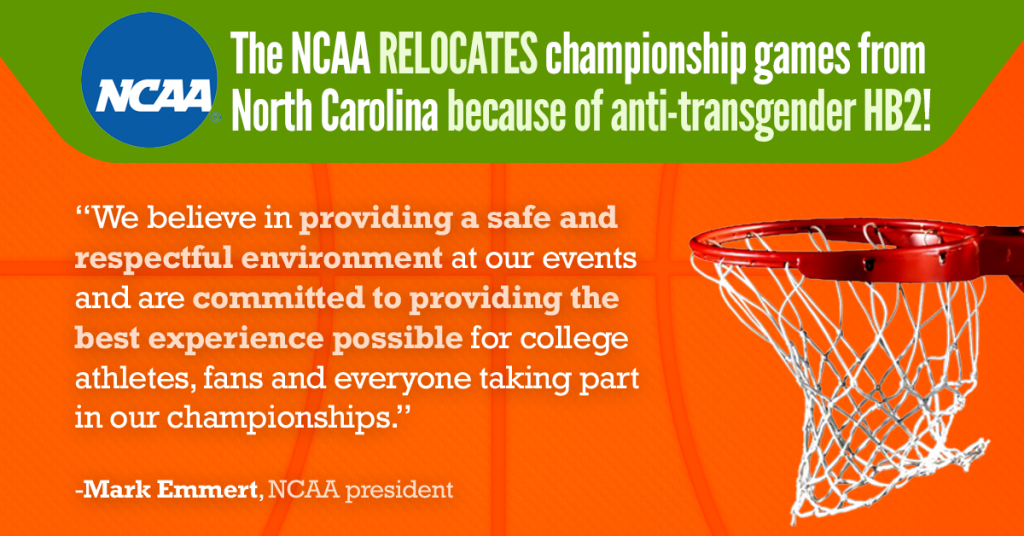The National Collegiate Athletic Association (NCAA) announced late Monday night that it will relocate 7 championship games out of North Carolina because of the state’s discriminatory HB 2.
The bill, which became law in March, effectively bans transgender people from using public restrooms and nullifies existing local LGBT non-discrimination laws, including one in Charlotte.

In a statement posted to its website, the NCAA made clear that North Carolina’s attempts to discriminate against LGBT people did not align with the organization’s “commitment to fairness and inclusion,” and thus it would be forced to relocate championships scheduled to be held in Cary, Greensboro and Greenville between December 2016 and May 2017. This decision comes a little over a month after the NBA announced it would take steps to move its 2017 All-Star game out of Charlotte due to HB 2.
The Charlotte Chamber of Commerce estimates that the discriminatory law has cost the Charlotte-Mecklenburg region at least $285 million on top the the more than $100 million lost from the All-Star game. The Greater Raleigh Convention and Visitors Bureau says the law has cost their region more than $40 million—a number likely to grow as the losses to Cary, a suburb of Raleigh that was scheduled to host 4 of the 7 cancelled championships, become more apparent.
This new episode in the saga of economic turmoil that has hit North Carolina since HB 2 passed should serve as a warning to Georgia lawmakers. Some extremists are already gearing up for another fight over LGBT non-discrimination protections during the 2017 session. Lawmakers shouldn’t take the bait.
Atlanta is scheduled to host several NCAA basketball tournament games leading up to the 2020 Final Four, including the men’s basketball south regional championships in 2018. Atlanta’s LGBT-inclusive human rights ordinance means the city is still eligible to host NCAA events, but passing discriminatory legislation—including any that impacts Atlanta’s local HRO—would imperil Atlanta’s host status.
Increasingly, businesses, entertainers, conventions, and major sporting events are investing in cities and states that ensure fair and equal treatment for all employees and patrons. In order to position ourselves competitively for NCAA collegiate games and other cash cow investments, lawmakers should take steps to ensure all people living in and visiting Georgia are fairly and equally protected from discrimination under state law.
UPDATE:
On Wednesday, September 14th—just two days after the NCAA’s decision to pull forthcoming championship games from North Carolina—the ACC is following suit, announcing it will relocate 8 championship games from the state in opposition to anti-transgender HB 2.
Most notably, Charlotte will lose the ACC championship football game, which it has hosted since 2010 and which banked $30 million for the city last year. In an official statement on the move, the ACC said:

SHARE THIS STORY



 @GeorgiaUnites
@GeorgiaUnites